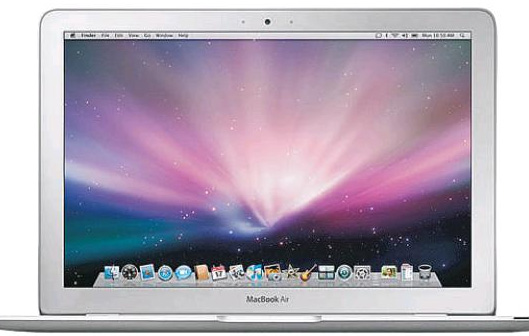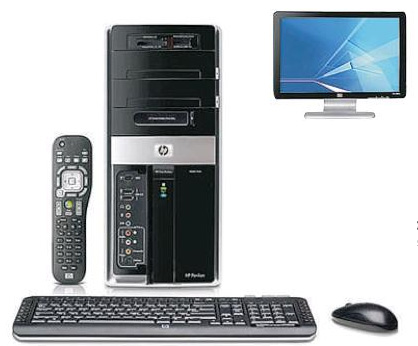Canadians are ditching their desktops for leaner notebooks as companies compete for slimmest, lightest machines
Misty Harris
Sun

Apple Macbook Air 13. Intel Core 2 duo processor 1.6 GHz 2 GB of 667 MHz DDR2 SDRAM. Size: 13 inches (32.5 cm) wide Weighs: 3 pounds (1.36 kg) Price: $1,898.99 Sourc: www.apple.com

Dell’s XPS M1330. Intel Core 2 Duo processor 667 MHz up to 4 GB of 667 MHz DDR2 SDRAM. Size: 13.3 inches (33.7 cm) wide. Weighs: 3.97 pounds (1.78 kg). Price: $999 – #1120. Source: www1.ca.dell.com

Hewlett Pachard Media Centre PC. AMD Athlon 64 X2 Dual-Core 2.7 GHz processor 3GB of RAM. Size: 20 inch LCD monitor (50 cm). Tower Weight: 22 pounds (10 kg). Price: $849.98. Source: www.futershop.ca
The pressure to be thin has claimed yet another victim: The desktop computer.
Industry monitor IDC Canada reports 2008 will be the first full year in which laptops eclipse desktop PCs in the Canadian market, a trend being driven in part by computer size wars.
Like cars, cellphones and supermodels before them, laptops are seeing their proportions shrink at an unprecedented pace, with top companies engaged in frenzied one-upmanship to build the slimmest, lightest machines. The thinnovation is paying off as Canadians ditch their comparatively obese desktops for leaner notebooks, which IDC predicts will account for fully 60 per cent of all consumer computer shipments (home and student use) and 55 per cent of the total Canadian market (includes corporate use) by the end of the year.
“From here on in, laptops will represent the majority,” says George Bulat, a director at IDC Canada. “More and more people, especially with wireless networks, are expecting to be able to go to Starbucks and fire up their computer. They’re not rooted to a home base any more.”
Although laptops briefly outpaced desktops during the third quarter of 2007, this is expected to be the first full year in which they dominate the category. By 2010, IDC forecasts laptops will represent 70 per cent of consumer PCs and 66 per cent of the total market.
And yes, size does matter. Along with the “mobile lifestyle” and the “almost negligible” price gap between laptops and desktops, Bulat cites the travel-friendly proportions of notebook computers as a major factor in their success.
Hewlett-Packard’s new, high-powered Voodoo Envy 133 is practically bulimic at just 3.4 pounds and 0.7 inches in thickness, while Dell’s sleek M1330 weighs just 3.97 lbs.
“The times are changing,” says Bib Patel, purchasing manager for Computer Trends Canada. “One of my first laptops was a 17-inch HP. … I took it with me on a trip to Victoria and it nearly ripped my shoulder off it was so heavy.”
Indeed, where the first laptops weighed in at more than 23 pounds, the new breed of portable computer is a scant two to four pounds, with some measuring less than three-quarters of an inch at their thickest point.
From Toshiba’s newly announced Portege R500-S5007V, a machine with a svelte 0.77-inch frame, to the MacBook Air, which can slip inside an envelope, the new milieu is one of a Lilliputian laptopia.
“Portability is the essence of this,” says Patel. “Anything that can be as powerful as possible but not take up too much space is what people are looking for.”
According to Forbes, the one-pound OQO Model 02 — a handheld PC small enough to be palmed like a PDA — may be where laptops are headed. The pint-sized computer is robust enough to run Windows, comes with built-in mobile broadband (allowing Internet access outside WiFi hotspots), can be connected to a monitor and keyboard at the office or used as-is on the road, and is small enough to tuck in your back pocket.
But Loreto Ceccarelli, owner of a Toronto IT company, says many of these digital darlings are more about flash than function. “Does the average family need an SUV or a pickup truck? No. Do they need to own a Cadillac? No, they don’t. It all comes down to prestige, and it’s the reason why [a student] will want to carry a MacBook Air to school,” says Ceccarelli, who heads Redss IT Solutions.
“They’re trying to ‘wow’ you because, I hate to say it, the average person could use a laptop that was developed five years ago and wouldn’t come close to using the whole CPU.”
© The Vancouver Sun 2008
